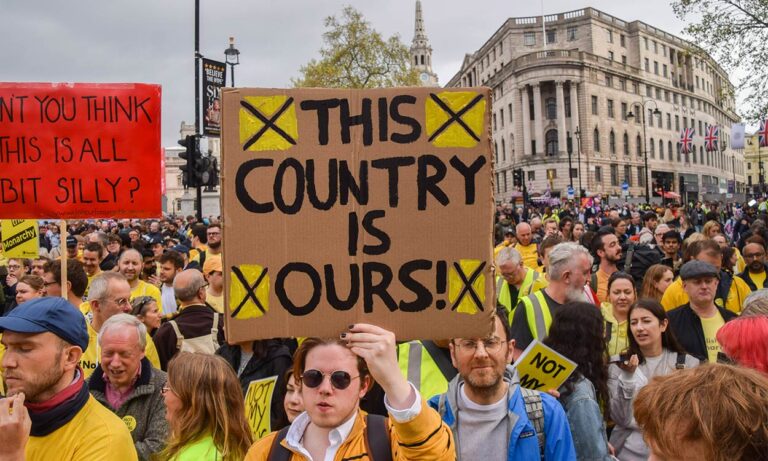What the recent arrests of anti-monarchy protesters by the Met police reveal about our core liberties

On Saturday 6 May 2023, while King Charles was being handed the most decadent sword in all of history, a group of six anti-monarchy protesters were arrested in London as they tried to exercise their democratic right. Placards in hand and inside of a car the group were hauled out of the centre of the city and arrested by guess who? None other than the Metropolitan police. Is anyone surprised?
Why are protesters in the UK under threat right now?
In 2022, a new bill was announced by the British government which laid out plans to massively restrict the freedom and rights of protesters in the UK. The Public Order Act received royal assent and therefore became an act of Parliament on 2 May 2023. And from what we can see, it’s already become a very useful tool for the ever-aggressive Met police.
The bill is quite extensive, but overall its primary powers revolve around the fact that the police now have far greater powers when it comes to stopping, halting, or completely stamping out any and all protests they deem “disruptive.” Of course, as far as the British government is concerned, every protest is “disruptive.
In most countries, a constitutional right to freedom of expression and peaceful assembly feels as though it should be an assured facet of everyday life. The problem is, UK institutions have decided to redefine what’s considered peaceful, and what’s not—this undemocratic shift massively impacts the rights of not only activists but also average citizens.
Current UK Prime Minister Rishi Sunak has made it abundantly clear that he supports the police when it comes to cracking down harder on activists. In a statement in January of this year, Sunak announced: “The right to protest is a fundamental principle of our democracy, but this is not absolute. A balance must be struck between the rights of individuals and the rights of the hard-working majority to go about their day-to-day business.”
The political leader carried on: “We cannot have protests conducted by a small minority disrupting the lives of the ordinary public. It’s not acceptable and we’re going to bring it to an end. The police asked us for more clarity to crack down on these guerrilla tactics, and we have listened.
Since when did holding up placards and chanting constitute guerrilla tactics? One of the primary kinds of activism the government is trying to quash is the disruption of public transport and railways, as well as the method of locking oneself to buildings or objects.
The sad truth of the matter is, Sunak and the rest of the Conservative party would rather give the authorities greater power to keep activists locked in prison, then address the legitimate problems this country is currently facing.
The Met police expresses “regret” for arresting the six anti-monarchy protesters
In a highly embarrassing and somewhat satisfying result, The Met police later apologised for arresting the six protestors on Coronation day. According to the BBC, Republic chief executive Graham Smith, who was among the group, said he has now received a personal apology from police officers. Smith stated: “They seemed rather embarrassed to be honest.” The activist also stated that the group would be taking action against the authorities.
A statement, publicised by the Met police following the release read: “We regret the arrests that were made at today’s protest. We respect the right to peaceful protest and we understand the importance of raising awareness of important issues such as climate change. However, we had no choice but to take action when protesters began to obstruct the highway and disrupt the coronation ceremony.
Members of Westminster City Council’s women’s safety campaign Night Stars, which distributes rape alarms and other goods, were also among the 64 persons detained on Saturday. Police had claimed that intelligence alleged the group were planning on using the alarms during the Coronation—in order to disrupt the procession, as reported by The Guardian.
Our generation has the power to shape the future and explore new ways of governing that accurately reflect our values and aspirations. These recent arrests clearly emphasise that the future we’ve all been worried about is already here.





